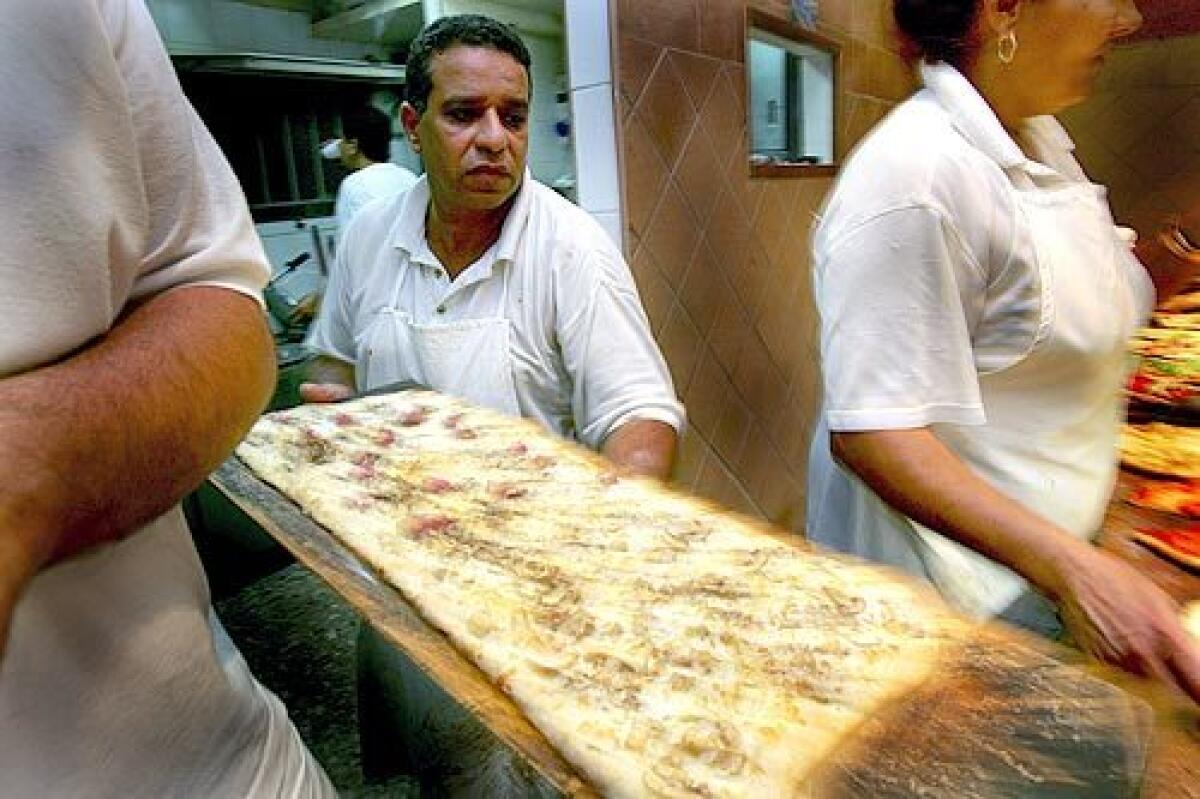From the archives: Muslims’ slice of Italy’s life

ROME — With the precision of a master chef, Magdy el Shahidy quickly sprinkles mushrooms and mozzarella on thin dough and slides the pizza into a stainless steel oven.
Customers, so many the line spills out into the street, inch their way toward the counter, where Shahidy’s eldest son is filling the orders. With a flick of the wrist, a swipe of the knife, 25-year-old Sobhi cuts the hot pizza into squares under a plaque quoting the Koran. Prosciutto. Zucchini. Rossa (“red,” for tomato sauce).
“Ciao, Magdy!” “Ciao, bella!” Everyone seems to know everyone on this quiet street in working-class Rome.
Egyptian-born Shahidy and his Tunisian-born wife, Sabrina, have owned and operated Pizzeria Le Rondini for more than a decade, the product of their 30 years in Italy, the adopted country where they met, married and had three children.
For them, the immigrant experience means no going back.
They have made assimilation such a priority that they speak Italian even among themselves (the parents with accents, the children without), only occasionally lapsing into a kind of Italarab, their version of Spanglish.
“We met here, we married here, our children were born here and schooled here. Everything is here,” says Sabrina, whose name is actually Heddi — Sabrina is easier for Italians to pronounce.
They identify themselves as Muslims, but rarely go to the mosque. Practicing their faith, they say, is made difficult by the demands of work and school on a West European timetable. It is Ramadan, for example, and Magdy and Sabrina say they are fasting during the holy month, but Sobhi is not, and 16-year-old daughter Manel tries but doesn’t always make it.
And they can’t have a proper iftar, the evening breaking of the fast, as it would mean interrupting the operation of the pizzeria.
Still, the family feels the tugs of tradition.
None of the children, no matter how old, will be allowed to move out of the parental home until they are married, Magdy says, following customs more typical of the Middle East than of Western Europe.
And Magdy wants his children to find good Muslim spouses, which is to say, produce good Muslim grandchildren. This is especially true for Manel, the only female child. He sends her back to Egypt for summer-long vacations every year, and she speaks the best Arabic among the children.
It is difficult to say how far the pretty girl with a dimpled smile and black curls cascading around her face will break from old-world tradition. She appears to be close to her parents, and spends a lot of her free time at home or at the pizzeria. Yet she also lives in her Italian world. She takes theater at school and dresses like all European girls her age, with low-rise jeans and black spandex tops.
Would she ever use a head scarf or veil? “No way!” she says (an opinion shared, not coincidentally, by her mother). She respects her parents but doesn’t hesitate to challenge them in dinner-table conversation.
Her father came to Italy in 1976, when he was 21, to escape military service in Egypt. In those days, Italy was the easiest place in Western Europe for which to get a visa. Sabrina came from Tunisia a year later to join an uncle, with the idea of staying only briefly to earn a little money. The two met at the home of mutual friends (another Egyptian-Tunisian couple) and within months decided to marry.
At first, Magdy washed dishes in a restaurant. He hated it, and would have quit and returned to Egypt if not for a sudden turn of luck: The cook walked off the job one day, and the boss put Magdy in his place. “I didn’t even speak Italian,” he says. “I had to look up [recipes] in books.”
He worked hard, honed his skills and now makes what he calls a damn good pizza. Sabrina worked with him in the restaurant; by 1992 they felt confident enough to open their own place.
“I wanted to have my own business but didn’t want to make it too big and risk too much,” Magdy says.
“We work a lot,” Sabrina says. “Too much.”
The Shahidys live in a comfortable house on the eastern outskirts of Rome, a tree-lined patch of suburbia where Magdy can see the stars at night from the rooftop terrace. The living room is decorated with miniature sculptures of Queen Nefertiti, Sphinx-like cats and the Leaning Tower of Pisa. There are Koranic verses on some walls, a poster of A.C. Milan, Italy’s top soccer team, on a door to one of the kids’ bedrooms.
In her room, Manel has dozens of framed photographs of her many Italian friends, as well as cousins from Tunisia and Egypt, lined up on her dresser. A lot of the friends are striking goofy poses. One of the cousins is covered.
Sobhi, tall and thin with close-cropped hair, has a huge graffiti tag spelling his name on an entire wall of his room. The other son, Ashraf, 21, with the hulking build of the rugby player he is, has decorated his room with dozens of baseball caps.
At home over a dinner of couscous, eggplant, salads and fish on a Monday night, the only day the pizzeria is closed, the Shahidys reflect on their Italian lives. An Egyptian pizza maker isn’t as odd as you might think, the family says. Arab cuisine shares numerous characteristics with Italian cooking; a recent survey in Rome said 40% of the city’s pizza chefs were Egyptian.
Magdy and Sabrina say they haven’t felt discriminated against, but both are quick to condemn the latest terrorist attack when talking to Italian acquaintances or customers.
“My friends ask me a lot, What is [Egypt] like? How does your religion work? Things like that,” Manel says. But no one is critical or insulting, she says.
The conversation turns to faith and tradition, the difficulty of maintaining a native cultural identity while trying to blend into an assumed one.
Perhaps surprisingly, Manel does not rebel when her parents declare that she will have to marry a Muslim — obligatory in the daughter’s case, they add, but not so in the sons’.
“It’s not about me,” Manel says. “The religion says a girl can’t marry a non-Muslim. Years ago it was a death penalty for breaking the rules. Now it’s not death but .”
The adults point out that ingrained social pressure is in part responsible for their opinion — what would the relatives think if Manel married outside the faith?
On that note, Manel does protest. “Arabs are too worried about what other people think,” she says. Islam “is a very pro-masculine religion.”
Magdy is adamant: “Good or bad, correct or mistaken, you have to keep your religion.”
The children, the family says, are the “bridge” between a generation still attached to the homeland and the new country. Magdy says he still considers himself Egyptian — from the land of the pharaohs, as he puts it — and Sabrina says she is Tunisian. The kids say they are a mix, but mostly Italian. Sobhi fulfilled his mandatory Italian military service obligation, and the kids say all their friends are Italian. The parents socialize with a small group of mostly Arab professionals in Italy.
Standing behind the pizza counter, Sobhi is every bit the Roman, from the cadence of his speech to his body language, that kind of permanent shrug typical of Romans, the tilting of the head and arching of the eyebrows when speaking, the expressive hand gesturing.
“Eh!” he says to the customers he knows. It is sort of a question, sort of an exclamation, sort of a greeting.
A skinny kid named Fabio orders four slices of prosciutto pizza. He’s a regular, as is Stefano, a kid with cigarettes behind his ears and an attitude. They carry their dinner to the white plastic tables on the sidewalk in front of the pizzeria, which is the size of a postage stamp.
It is an early autumn evening, and business is brisk even though it’s the middle of the week. Manel is sitting with several girlfriends engaged in lively chatter. “Ahi, Madonna!” she exclaims at some bit of gossip.
Within earshot are her grandparents, Magdy’s 78-year-old father and 70-year-old mother, visiting Italy for the first time. They’re sitting under signs advertising Beck’s beer and Murphy’s Irish Stout, he in a dishdasha robe, she in a cloak and head scarf. They avoid the pizza for fear it contains pork.
As business winds down, Sobhi, who would like to take over his parents’ business one day and perhaps expand the restaurant, quits for the night. He takes off his apron and washes pizza flour from his hands.
His is a personality of conflict. Like a good Muslim, he does not drink alcohol. He felt compelled to end a relationship with an Italian girlfriend who asked him, to his parents’ horror, to move in with her.
Wouldn’t his parents be disappointed if he married a woman not to their liking?
“It’s my life,” he says.
And what about Manel? “Poor thing,” he says, almost sarcastically. Then he adds seriously, “It’s a family matter.”
With that, Sobhi is through. Two young Italian women who have been waiting for him much of the evening approach. Each hangs on to one of his arms, and they walk off in the night.
*
(BEGIN TEXT OF INFOBOX)
*(BEGIN TEXT OF INFOBOX)
Growing fast
There are about 1 million Muslims in Italy, constituting about 2% of the population, but their numbers increased rapidly during a two-decade period. They are concentrated in the north of the country as well as in the cities of Rome and Naples and in Sicily. European countries with the most Muslims:
| 1982-2003 | 2003 percentage | ||
| Muslims | increase | of population | |
| France | 5,000,000 | 100% | 8.3 |
| Germany | 4,000,000 | 122 | 4.9 |
| Britain | 1,600,000 | 28 | 2.7 |
| Italy | 1,000,000 | 733 | 1.8 |
| Spain | 1,000,000 | 733 | 2.4 |
Sources: U.S. State Department, Open Society Institute
More to Read
Sign up for Essential California
The most important California stories and recommendations in your inbox every morning.
You may occasionally receive promotional content from the Los Angeles Times.











